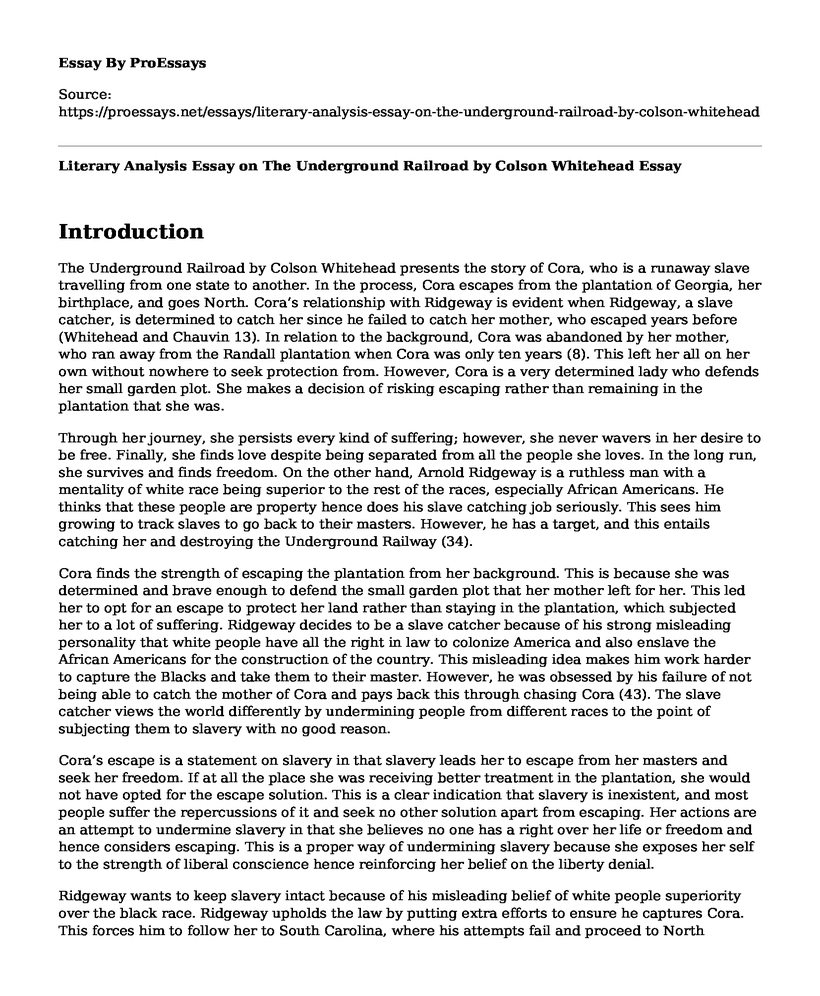Introduction
The Underground Railroad by Colson Whitehead presents the story of Cora, who is a runaway slave travelling from one state to another. In the process, Cora escapes from the plantation of Georgia, her birthplace, and goes North. Cora’s relationship with Ridgeway is evident when Ridgeway, a slave catcher, is determined to catch her since he failed to catch her mother, who escaped years before (Whitehead and Chauvin 13). In relation to the background, Cora was abandoned by her mother, who ran away from the Randall plantation when Cora was only ten years (8). This left her all on her own without nowhere to seek protection from. However, Cora is a very determined lady who defends her small garden plot. She makes a decision of risking escaping rather than remaining in the plantation that she was.
Through her journey, she persists every kind of suffering; however, she never wavers in her desire to be free. Finally, she finds love despite being separated from all the people she loves. In the long run, she survives and finds freedom. On the other hand, Arnold Ridgeway is a ruthless man with a mentality of white race being superior to the rest of the races, especially African Americans. He thinks that these people are property hence does his slave catching job seriously. This sees him growing to track slaves to go back to their masters. However, he has a target, and this entails catching her and destroying the Underground Railway (34).
Cora finds the strength of escaping the plantation from her background. This is because she was determined and brave enough to defend the small garden plot that her mother left for her. This led her to opt for an escape to protect her land rather than staying in the plantation, which subjected her to a lot of suffering. Ridgeway decides to be a slave catcher because of his strong misleading personality that white people have all the right in law to colonize America and also enslave the African Americans for the construction of the country. This misleading idea makes him work harder to capture the Blacks and take them to their master. However, he was obsessed by his failure of not being able to catch the mother of Cora and pays back this through chasing Cora (43). The slave catcher views the world differently by undermining people from different races to the point of subjecting them to slavery with no good reason.
Cora’s escape is a statement on slavery in that slavery leads her to escape from her masters and seek her freedom. If at all the place she was receiving better treatment in the plantation, she would not have opted for the escape solution. This is a clear indication that slavery is inexistent, and most people suffer the repercussions of it and seek no other solution apart from escaping. Her actions are an attempt to undermine slavery in that she believes no one has a right over her life or freedom and hence considers escaping. This is a proper way of undermining slavery because she exposes her self to the strength of liberal conscience hence reinforcing her belief on the liberty denial.
Ridgeway wants to keep slavery intact because of his misleading belief of white people superiority over the black race. Ridgeway upholds the law by putting extra efforts to ensure he captures Cora. This forces him to follow her to South Carolina, where his attempts fail and proceed to North Carolina. On the other hand, Cora breaks the law by running away from her master to seek her freedom (75). She runs away as a way of finding justice, which is not taken into considerations by such people who are enslaving people like her. Different from law, justice has normative power. If doing a particular thing is just, then people should do it. One might say that judges will refer to the law even in cases that the law is unjust. Therefore, for a judge, following the law is very significant than justice. This statement is an indication that justice is something beyond the law because people need the law to ensure justice, even despite the law being wrong. Justice is the inherent law component, and it is not separate from it.
When Cora was escaping from the Georgia plantation, her birthplace, she travels North in the underground train. Ridgeway is persistent and determined to catch her. This makes him to follow her to South Carolina, hereby, he captures Caesar. Cora is still on the run towards the North Carolina, where she spent a lot of time in her hiding place before Ridgeway discovered and captured her. In an attempt to capture her, she hits him on the head hence leading to his death. Her escape journey sees her going through Tennessee, Indiana, and lastly, the West, whereby she would ride along the underground railroad. Ridgeway attempted to capture her, but she hits him on the head, resulting in his death (76). Cora kills misery and slavery when she kills Ridgeway because that was the beginning of her freedom.
Work Cited
Whitehead, Colson, and Serge Chauvin. Underground railroad. Albin Michel, 2017.
Cite this page
Literary Analysis Essay on The Underground Railroad by Colson Whitehead. (2023, Aug 10). Retrieved from https://proessays.net/essays/literary-analysis-essay-on-the-underground-railroad-by-colson-whitehead
If you are the original author of this essay and no longer wish to have it published on the ProEssays website, please click below to request its removal:
- Comparative Essay Sample: Little Children and Hamlet
- Essay Example on Personal Perception of Doctor Victors Frankenstein
- Essay Example on Kurt Vonnegut Revisits Dresden: A Guggenheim Tale
- Community, Identity, Stability: Critical Essay on Brave New World
- Essay Sample on Freedom for All: Claiming Power and Overcoming Obstacles
- Analyzing Joseph Conrad's Heart of Darkness Essay Example
- Essay Example on Dracula & Tiger's Wife: Unique But Alike Books







